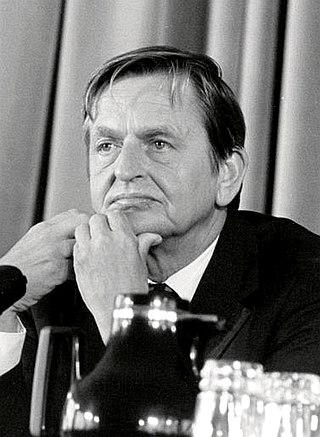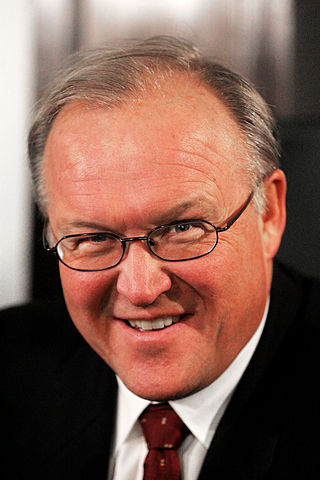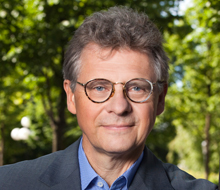
Sven Olof Joachim Palme was a Swedish politician and statesman who served as Prime Minister of Sweden from 1969 to 1976 and 1982 to 1986. Palme led the Swedish Social Democratic Party from 1969 until his assassination in 1986.

Jan Pieter"Jan Peter" Balkenende Jr. is a Dutch politician of the Christian Democratic Appeal (CDA) party and jurist who served as Prime Minister of the Netherlands from 22 July 2002 to 14 October 2010.

Hans Göran Persson is a Swedish politician who served as Prime Minister of Sweden from 1996 to 2006 and leader of the Swedish Social Democratic Party from 1996 to 2007.

Gösta Ingvar Carlsson is a Swedish politician who twice served as Prime Minister of Sweden,first from 1986 to 1991 and again from 1994 to 1996. He was leader of the Swedish Social Democratic Party from 1986 to 1996. He is best known for leading Sweden into the European Union.

The Swedish Social Democratic Party,formally the SwedishSocial Democratic Workers' Party,usually referred to as The Social Democrats,is a social democratic and a democratic socialist political party in Sweden. Globally,it is a full member of the Progressive Alliance and the Party of European Socialists.

Jean-Claude Juncker is a Luxembourgish politician who was the 23rd prime minister of Luxembourg from 1995 to 2013 and 12th president of the European Commission from 2014 to 2019. He also was Finance Minister from 1989 to 2009 and President of the Eurogroup from 2005 to 2013.

Anker Henrik Jørgensen was a Danish politician who served at various times as prime minister and foreign minister of Denmark. Between 1972 and 1982 he led five cabinets as prime minister. Jørgensen was president of the Nordic Council in 1986 and 1991.

Rut Birgitta Dahl is a Swedish former politician of the Social Democratic Party. Dahl was a Member of Parliament from 1969 to 2002. She served as Minister for Energy from 1982 to 1990,as Minister for the Environment from 1986 to 1991,and as Speaker of the Parliament from 1994 to 2002. She was the chairman of the Swedish section of the United Nations Children's Fund (UNICEF) between 2005 and 2011.

Klas Eklund is a Swedish economist and author.

Carl Johan Gustaf Swartz was a Swedish right-wing politician who served as Prime Minister of Sweden from March to October 1917. He also served as Minister for Finance from 1906 to 1911. He married Dagmar Lundström in 1886,with whom he had three children,Erik,Brita and Olof.

Rudolf Alfred Meidner was a Swedish economist and socialist.
Folkhemmet is a political concept that played an important role in the history of the Swedish Social Democratic Party and the Swedish welfare state. It is also sometimes used to refer to the long period between 1932 and 1976 when the Social Democrats were in power and the concept was put into practice,but also works as a poetic name for the Swedish welfare state. Sometimes referred to as "the Swedish Middle Way",folkhemmet was viewed as midway between capitalism and socialism. The base of the folkhem vision is that the entire society ought to be like a family,where everybody contributes,but also where everybody looks after one another. The Swedish Social Democrats' successes in the postwar period is often explained by the fact that the party managed to motivate major social reforms with the idea of the folkhem and the national family's joint endeavor.

The deputy prime minister of Sweden is the deputy head of government of Sweden. The incumbent deputy prime minister is Ebba Busch.
Odd Erik Lennart Engström was a politician of the Swedish Social Democratic Party. He was born in Silbodal,Årjäng,Värmland County,Sweden and was educated at University of Uppsala.
Employee funds,sometimes referred to as Wage Earner funds,is a socialist version of sovereign wealth funds whereby the Swedish government taxed a proportion of company profits and put into special funds charged to buy shares in listed Swedish companies,with the goal of gradually transferring ownership in medium to large companies from private to collective employee ownership. The funds were controlled by representatives of Swedish trade unions.
Kanslihushögern is a political concept in Sweden that originated during the 1980s in the right-wing of the Swedish Social Democratic Party and was strongly represented in the Cabinet Office and the Ministry of Finance during this time.
Kjell Larsson was a Swedish social democrat politician. He held many positions in the social democratic party and was one of the advisors to leading Swedish social democrats,namely Olof Palme and Ingvar Carlsson. He served as the minister of environment for two years between 1998 and 2000.

The Minister of Economics was a member of the government of Sweden. The minister of economics was the head of the Ministry of Economics from 1976 to 1982 which dealt with long-term guidelines for economic policy,the principle orientation of financial and credit policy,international economic cooperation,statistics,questions regarding banking and insurance,the stock exchange and the monetary system.

The Minister for the Budget was a member of the government of Sweden. The minister for the budget was the head of the Ministry of the Budget from 1976 to 1982 which was primarily responsible for budget regulation as well as the general administration and accounting of state funds,the state and municipal tax system. State land and buildings,alcoholic beverages,resident registration,press support and information,personnel administrative planning,personnel health care,etc. within the state's area of responsibility,administrative democracy,etc. and training of government employees.

Svante Lundkvist (1919–1991) was a Swedish trade unionist and social democratic politician. He held various cabinet posts,including minister of communication,minister of civil service affairs and minister of agriculture. He was a long-term member of the Parliament serving between 1959 and 1986.















